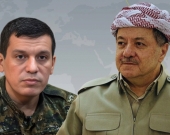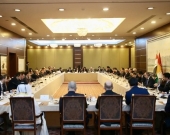Iran says offers ideas to end rift with U.N. nuclear watchdog

Iran's deputy foreign minister said he had made proposals to the U.N. nuclear watchdog chief on Monday after pledging "a new approach" to easing international concerns about indications of illicit atomic bomb research by Tehran.
The U.N. agency wants to resume an investigation, long stymied by Iranian non-cooperation, into what it calls the "possible military dimensions" of the Islamic Republic's atomic activities. Tehran says it is enriching uranium solely for electricity generation and medical treatments.
Hopes of overcoming the stalemate between Iran and the U.N. International Atomic Energy Agency (IAEA) over the nature of the nuclear program have risen since the election of a moderate president committed to easing Tehran's isolation.
Deputy Foreign Minister Abbas Araqchi said he had had "very useful and constructive" discussions with IAEA Director General Yukiya Amano and had made proposals to him to be addressed in detail by senior IAEA and Iranian experts later in the day.
"I am very hopeful that we can come out with a good result," Araqchi, a top Iranian nuclear negotiator, told reporters after his meeting with Amano in Vienna.
It was the first high-level IAEA-Iranian meeting since Iranian President Hassan Rouhani took office in early August promising to drop confrontation in favor of conciliation in the diplomacy of the Islamic state, seeking relief from harsh Western sanctions now hobbling its oil-based economy.
"It is very important for all of us that we can show concrete progress," Amano said, seated across a table from Araqchi at IAEA headquarters as the meeting got under way.
The two sides would discuss "ways forward to address all the outstanding issues regarding Iran's nuclear program. These are longstanding and complicated issues", Amano added.
Araqchi said: "We think this is the time to take a new approach to resolving (questions) between Iran and the IAEA and look to the future for further cooperation" between them.
Iran's nuclear activity "is peaceful and it will remain peaceful forever", he said.
The technical-level IAEA-Iran talks - the 12th such meeting since January 2012 and paralleling a revival of negotiations between Iran and six world powers - began around 3:30 p.m. (1430 GMT) and were due to last about three hours.
IAEA WANTS MILITARY BASE ACCESS
Expectations for Monday's Vienna talks were relatively high after a series of failed meetings and diplomats believed Iran might soon offer some concessions, perhaps by permitting U.N. inspectors to visit its Parchin military base southeast of Tehran - long an IAEA priority.
"Everybody now expects something," a Western diplomat said.
The IAEA suspects that nuclear-related explosives tests were conducted in a steel chamber at the sprawling military complex, possibly a decade ago, and wants inspectors to interview officials to shed light on what happened there.
It has acknowledged, however, that it may no longer unearth any useful evidence at Parchin due to suspected Iranian efforts to remove any incriminating nuclear-linked traces there. Iran says Parchin is a conventional army base.
Taking advantage of the diplomatic opening enabled by Rouhani, Iran and six world powers are pursuing separate negotiations towards a broader political settlement of the dispute to head off any risk of a new Middle East war.
Their last meeting was held on October 15-16 in Geneva, and another one is scheduled for November 7-8. Experts from the two sides will meet in Vienna later this week.
An end to Iran's higher-grade enrichment of uranium is a central demand of the powers. Refining uranium to 20 percent is sensitive as it is a relatively short technical step to raise that to the 90 percent needed for making a nuclear weapon.
Rouhani's pursuit of substantive negotiations and detente with the West marks a dramatic departure from eight years of ideological belligerence under hardline conservative predecessor Mahmoud Ahmadinejad.
Rouhani spoke by telephone with U.S. President Barack Obama in September, the loftiest such contact between the long estranged countries since Iran's 1979 Islamic Revolution.
(Editing by Mark Heinrich)
By Fredrik Dahl












